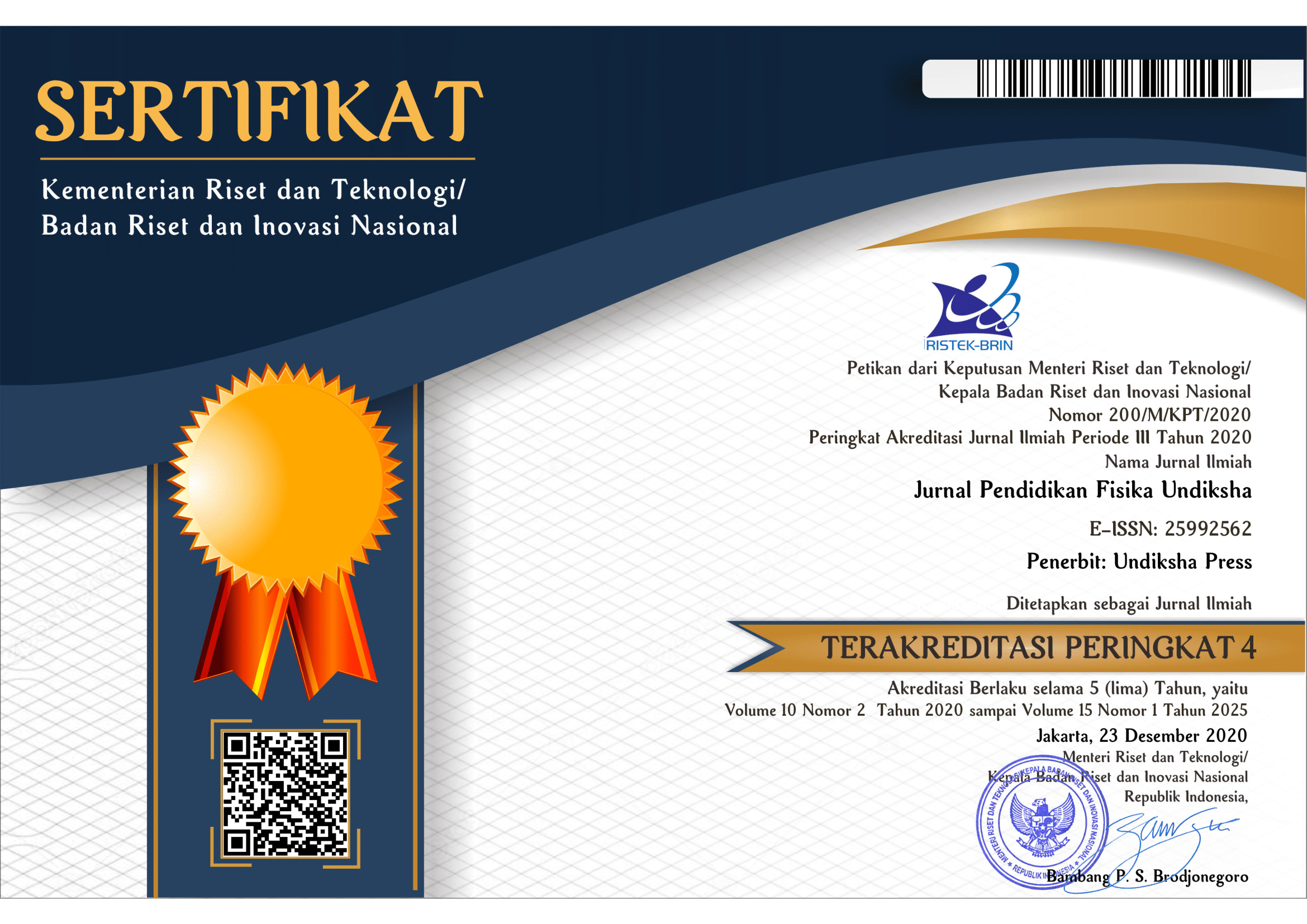THE EFECTS OF TUTOR-LESS PROBLEM BASED LEARNING TOWARDS PHYSICS PROBLEM SOLVING SKILLS OF 10TH GRADE STUDENTS AT A SENIOR HIGH SCHOOL
DOI:
https://doi.org/10.23887/jjpf.v1i1.3564Abstract
Penelitian ini bertujuan menganalisis pengaruh model tutor-less problem based learning (TL-PBL), model problem based learning (PBL), dan model pembelajaran konvensional (MPK) terhadap kemampuan pemecahan masalah fisika. Jenis penelitian ini adalah penelitian eksperimen semu (quasi exsperiment) dengan rancangan non-equivalent pretest-posttest control group design. Populasi penelitian ini adalah siswa kelas X SMA Negeri 1 Seririt Tahun Pelajaran 2013/2014. Sampel terdiri dari 3 kelas dengan jumlah 119 siswa yang ditentukan secara simple random sampling. Data kemampuan pemecahan masalah fisika dikumpulkan menggunakan 12 butir tes uraian. Data dianalisis secara deskriptif, statistik ANAVA satu jalur, simple effects Tukey HSD untuk menguji pasangan skor rata-rata kelompok perlakuan. Hasil penelitian menunjukkan temuan-temuan sebagai berikut. (1) Terdapat perbedaan yang signifikan pada kemampuan pemecahan masalah fisika antara kelompok siswa yang difasilitasi model TL-PBL, kelompok siswa yang difasilitasi model PBL, dan kelompok siswa yang difasilitasi MPK (F=13,275; p<0,05). Kemampuan pemecahan masalah fisika siswa dengan model TL-PBL (X=74,79) pada kategori tinggi sementara kemampuan pemecahan masalah fisika pada model PBL (X=63,51) dan MPK (X=60,29) berada pada kategori cukup. (2) Terdapat perbedaan yang signifikan pada kemampuan pemecahan masalah fisika antara kelompok siswa yang difasilitasi model TL-PBL dan model PBL (F=8,294; p<0,05). (3) Kemampuan pemecahan masalah fisika antara kelompok siswa yang difasilitasi model TL-PBL lebih tinggi dibandingkan dengan kelompok MPK (Q=7,13; p<0,05). (4) Kemampuan pemecahan masalah fisika antara kelompok model PBL lebih tinggi dibandingkan kelompok MPK (Q=4,05; p<0,05).Kata Kunci : kemampuan pemecahan masalah fisika, model problem based learning, dan tutor-less.
This research aimed at analyzing the effect of the tutor-less problem based learning model (TL-PBL), problem based learning model (PBL), and convensional learning model (CLM) towards the physics problem solving skill. This research was a quasi experiment with one way pretest-posttest non-equivalent control groups design. Population was the whole 10th grade students of SMA Negeri 1 Seririt in academic year 2013-2014. Total samples were 3 classes which consisted of 119 students, and samples were taken by using simple random sampling method. Data of problem solving skills were collected by 12 items of essay questions. Data were analyzed descriptively and used one way ANOVA and Tukey HSD for determining the difference problem solving skill scores among groups. The results indicate that: (1) There are significant differences in physics problem solving skill of the students among TL-PBL, PBL, and CLM (F=13.275; p<0.05). Physics problem solving skill of the students who are taught by using TL-PBL (X=74.79) is at "high" qualification while the students who are taught by using PBL (X=63.51) and CLM (X=60.29) are at "fair" qualification. (2) There are significant differences in physics problem solving skill of the students between TL-PBL and PBL (F=8.294; p<0.05). (3) Physics problem solving skill of the students who are taught by using TL-PBL is higher than CLM (Q=7.13; p<0.05). (4) Physics problem solving skill of the students who are taught by PBL is higher than CLM (Q=4.05; p<0.05).
keyword : problem based learning, physics problem solving skill, and tutor-less
Published
2014-07-21
Issue
Section
Articles
License

Jurnal Pendidikan Fisika Undiksha is licensed under a Creative Commons Attribution-ShareAlike 4.0 International License.






